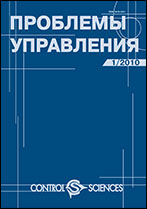|
Control in the socio-economic systems
Disruptive situational control
V. P. Bauera, A. A. Zatsarinnyb, N. I. Ilyinc, K. K. Kolinb, V. E. Lepskiid, G. G. Malinetskiie, A. N. Raikovfd, S. N. Sil'verstovg
a Financial University under the Government of the Russian Federation
b Federal Research Center "Computer Science and Control" of Russian Academy of Sciences, Moscow
c Management of Information Systems of Special Communication of FSO of Russia, Moscow
d Institute of Philosophy, Russian Academy of Sciences, Moscow
e Keldysh Institute of Applied Mathematics of Russian Academy of Sciences, Moscow
f V. A. Trapeznikov Institute of Control Sciences of Russian Academy of Sciences, Moscow
g Institute of Economic Policy and Economic Security, Financial University under the Government of the Russian Federation, Moscow
Abstract:
It is noted that the classical approach to situational control is based on the possibilities of logical-linguistic models, artificial intelligence, deductive and inductive inference, neural and expert systems. It is shown that the issues of social, humanitarian and cognitive nature, fast coordination of collective decisions in a self-organizing environment, civil and expert participation take on particular relevance now. The increase in the complexity of models' semantics is substantiated: it is not in several times, but in several orders of magnitude higher. A new – disruptive – paradigm of situational control is proposed, in which the system of distributed situational development centers becomes the main institutional and digital platform for support of the collective processes of participants consolidation at all levels of government.
Keywords:
cognitive semantics, self-organization, situational control, strategic planning, situational development centers, decision support systems.
Citation:
V. P. Bauer, A. A. Zatsarinny, N. I. Ilyin, K. K. Kolin, V. E. Lepskii, G. G. Malinetskii, A. N. Raikov, S. N. Sil'verstov, “Disruptive situational control”, Probl. Upr., 2018, no. 5, 31–38
Linking options:
https://www.mathnet.ru/eng/pu1099 https://www.mathnet.ru/eng/pu/v5/p31
|

|



 Contact us:
Contact us: Terms of Use
Terms of Use
 Registration to the website
Registration to the website Logotypes
Logotypes